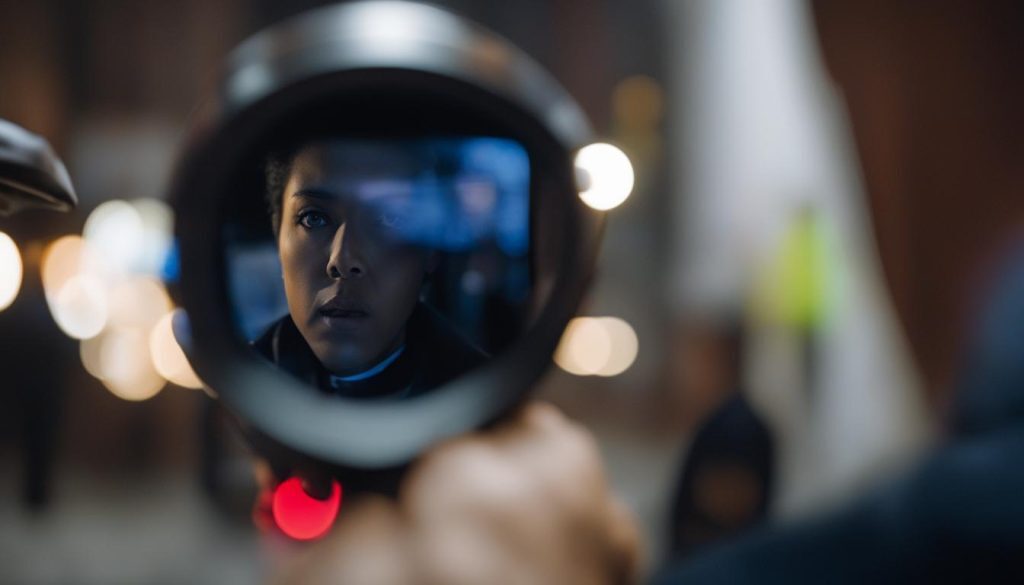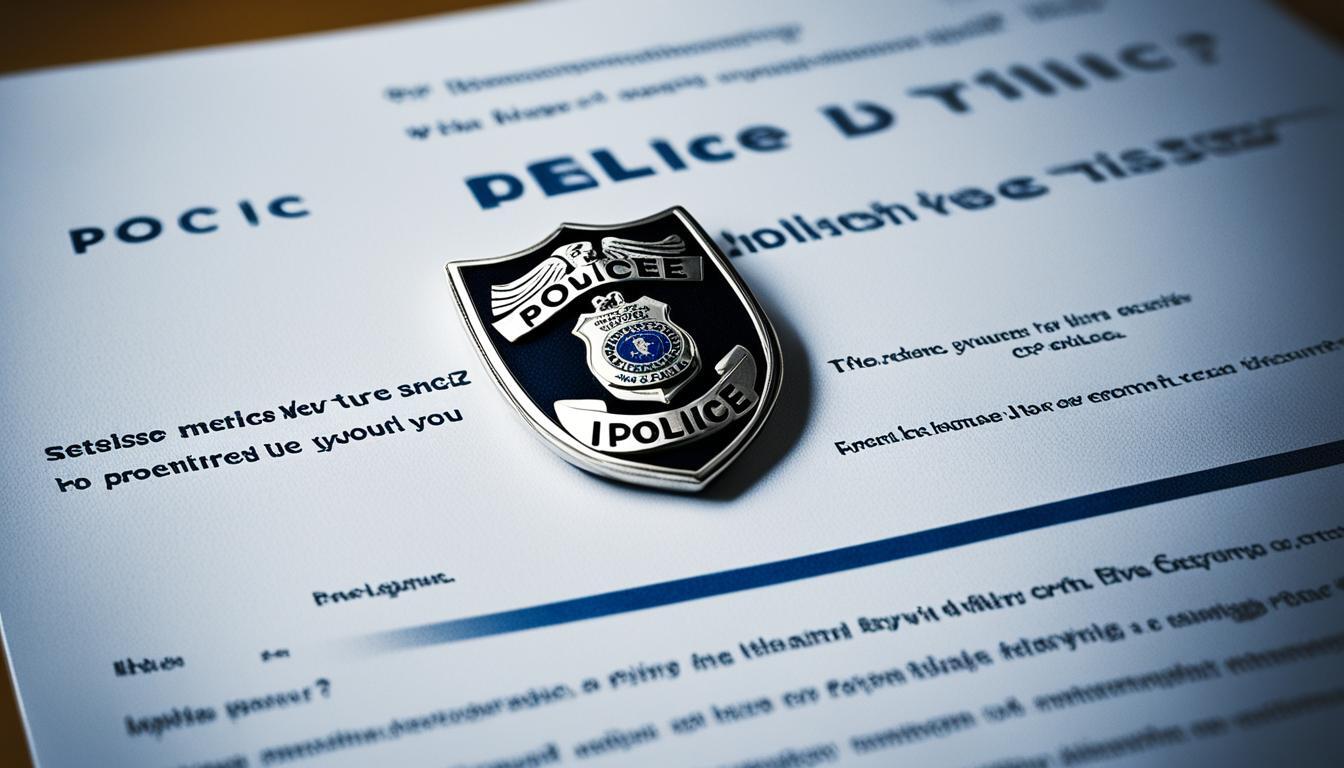Are Police Drug Investigating You? Find Out How
Did you know that drug-related offenses account for a significant portion of law enforcement investigations in Canada? With the ongoing efforts to combat illegal drug activities, it’s important to be aware of the signs that you may be under police scrutiny for drug involvement. By recognizing these indicators and taking the necessary steps to protect your rights, you can navigate through a potentially challenging situation with confidence.
If you suspect that law enforcement officers are targeting you specifically for drug-related crimes, it is important to be aware of certain signs that may indicate their focus on your activities. Unusual police contact, police surveillance, unmarked police vehicles, increased police presence in your neighborhood, social media requests from unknown individuals, and law enforcement officials contacting your friends and family are all potential indicators that you may be under investigation for drug-related offenses. It’s important to stay calm, take the necessary steps to protect your rights, and consult with an experienced criminal defense attorney.
Key Takeaways:
- Signs of police scrutiny for drug offenses include unusual police contact, surveillance, unmarked vehicles, increased police presence, social media requests from unknown individuals, and contact with friends and family.
- Law enforcement is not obligated to inform you if you are under investigation for drug-related offenses.
- You have rights when being investigated, including the right to remain silent, the right to legal representation, protection against unreasonable searches and seizures, the right to due process, and the presumption of innocence.
- Indicators of police investigation for drug crimes may include suspicious packages or mail, unusual chemical smells, drug paraphernalia found on your property, unusual electronic equipment, and strange behavior from neighbors.
- Determining if you’re being set up by the police can be difficult, but signs may include unusual solicitation, coercion or threats, involvement of informants or undercover agents, unusual knowledge, and confidential information.
Signs You Might be Under Police Investigation
Recognizing the signs that you might be under police investigation can help you protect your rights and make informed legal decisions. Some common signs include:
- Unusual police contact: If you find yourself being pulled over more frequently or receiving unsolicited visits from officers, it could be a sign that you are under investigation.
- Police surveillance: Keep an eye out for suspicious individuals loitering near your home or unfamiliar vehicles parked near your property. These could be indicators of police surveillance.
- Increased police presence: If you notice an unusual increase in police presence in your neighborhood, it may suggest that they are focusing on activities in the area.
- Social media requests from unknown individuals: Be cautious if you receive friend requests or messages from people you don’t know on social media platforms. It could be a tactic used by law enforcement to gather information.
- Law enforcement officials contacting friends and family: If law enforcement reaches out to your friends and family for information about you, it is a clear sign that they are investigating your activities.
Being aware of these signs can help you take appropriate steps to protect your rights and consult with an experienced criminal defense attorney for guidance.

Is it Essential for the Police to Tell You if You’re Being Investigated?
No, it is not essential for the police to tell you if you are being investigated. Law enforcement agencies often conduct investigations discreetly to gather evidence and ensure the integrity of the investigation. They are not required to disclose this information to you unless they are ready to make an arrest or take further legal action. You have the right to inquire if you are under investigation, but the police may choose not to provide any information or provide limited information about the ongoing investigation.

When it comes to police investigations, secrecy is often necessary to effectively tackle criminal activities. The police have the responsibility to protect the integrity of an investigation and prevent the destruction of evidence or potential harm to individuals involved.
The decision to disclose or withhold information about an ongoing investigation is influenced by various factors, including the nature of the crime, the stage of investigation, and the potential risks involved.
As an individual who may be under investigation, you may have concerns about your rights and the transparency of the process. It is important to understand that while you may not be entitled to detailed information about an ongoing investigation, you do have rights in the investigative process.
Your Right to Know
Although the police are not obligated to disclose the fact that you are under investigation, you do have the right to inquire about your status. You can politely ask law enforcement if you are under investigation, but be prepared for the possibility that they may choose not to provide a direct answer or may only provide limited information.
In some cases, law enforcement may choose to inform you that you are a person of interest or a potential suspect, especially if they have substantial evidence against you or if an arrest is imminent.
It is important to remember that any information shared by law enforcement during an investigation is not meant to be used against you in court. If you find yourself in a situation where you suspect you are under investigation, it is wise to consult with a criminal defense attorney who can provide guidance and protect your rights throughout the process.
Police Disclosure of Investigation
While the police may not be forthcoming about an ongoing investigation, certain circumstances may require them to disclose information. These circumstances include:
- If the police obtain a warrant to search your property or arrest you, they are required to provide you with relevant information regarding the search or arrest.
- If you are arrested, you have the right to be informed about the charges brought against you.
- If the investigation leads to charges being filed against you, the prosecution will disclose the evidence they have against you as part of the legal process.
It is crucial to consult with an attorney who can navigate the legal system, protect your rights, and ensure that any information disclosed by law enforcement is properly handled during your defense.
| Can You Ask if You’re Under Investigation? | Police Disclosure of Investigation |
|---|---|
|
|
While it can be unsettling not knowing if you are under investigation, it is crucial to respect the investigative process and protect your rights by seeking legal counsel.
Rights of a Person When Being Investigated
When I find myself under investigation by law enforcement, I have certain rights that are protected by the law. These rights ensure that I am treated fairly and in accordance with the principles of justice. It is crucial to be aware of these rights and to exercise them to safeguard my interests.
One of the most fundamental rights I have during an investigation is the right to remain silent. This means that I am not obligated to answer any questions or provide any information that may incriminate myself. By remaining silent, I can avoid potentially saying something that could be used against me later on.
Another important right is the right to legal representation. I have the right to have an attorney present during any questioning or interactions with law enforcement. This allows me to have someone who is knowledgeable about the law and can guide me through the process, protecting my interests and ensuring that my rights are upheld.
I am also protected against unreasonable searches and seizures. Law enforcement must have probable cause or a warrant to conduct a search of my person, property, or belongings. This protection ensures that my privacy is respected and that I am not subjected to unwarranted intrusion.
Furthermore, I have the right to due process. This means that I am entitled to a fair and impartial legal proceeding. I have the right to be informed of the charges against me, to present evidence and witnesses in my defense, and to confront any witnesses or evidence presented against me.
Lastly, I am presumed innocent until proven guilty. This presumption ensures that the burden of proof lies with the prosecution. I am not required to prove my innocence, but rather the prosecution must present evidence that proves my guilt beyond a reasonable doubt.
It is crucial to understand and assert these rights when being investigated. They serve as important safeguards to protect my interests and ensure that I am treated fairly throughout the process.
| Rights | Description |
|---|---|
| Right to Remain Silent | I have the right to refuse to answer any questions that may incriminate myself. |
| Right to Legal Representation | I have the right to have an attorney present during any interactions with law enforcement. |
| Protection against Unreasonable Searches and Seizures | Law enforcement must have probable cause or a warrant to conduct a search of my person, property, or belongings. |
| Right to Due Process | I have the right to a fair and impartial legal process, which includes being informed of the charges against me and having the opportunity to present a defense. |
| Presumption of Innocence | I am presumed innocent until proven guilty, and the burden of proof lies with the prosecution. |
Indicators of Police Investigation for Drug Crimes
When it comes to the possibility of being investigated for drug crimes by law enforcement, there are certain indicators that you should be aware of. These indicators can help you recognize if you are under scrutiny and take appropriate actions to protect your rights.
Suspicious Packages or Mail: Receiving unexpected packages or mail that appear suspicious or are from unknown senders can be a red flag. It’s crucial to exercise caution and refrain from opening or accepting such packages as they may be linked to illicit drug activities.
Unusual Chemical Smells: If you notice persistent and unusual chemical smells emanating from your property or vicinity, it could indicate the presence of drug manufacturing or cultivation operations nearby. Such odors may be associated with the production of drugs like methamphetamine or marijuana.
Drug Paraphernalia Found on Your Property: The discovery of drug paraphernalia, such as syringes, pipes, or other items commonly used for drug consumption or production, on your property can suggest involvement in drug-related activities. It’s essential to refrain from handling or disposing of such items and seek legal advice immediately.
Unusual Electronic Equipment: Coming across unfamiliar electronic equipment, such as surveillance cameras, encrypted communication devices, or other advanced technology, around your property or vehicle may be a sign of drug-related activities or law enforcement monitoring. If you encounter such equipment, it’s crucial to document and report it responsibly.
Strange Behavior from Neighbors: If you observe frequent visits from law enforcement officers to your neighbors’ homes or they begin questioning you about your activities, it could indicate that they are under investigation and you may also be targeted. Pay attention to any unusual behaviors or inquiries from neighbors and remain vigilant.
Recognizing these indicators can help you stay informed and take appropriate measures to protect your rights. If you suspect that you are under investigation for drug crimes, it is essential to consult with an experienced criminal defense attorney who can guide you through the legal process and ensure your rights are safeguarded.
How to Determine if You’re Being Set Up by Police
It can be challenging to definitively determine if you are being set up by the police, but there are some signs and behaviors that may raise suspicions. Awareness and vigilance are key in recognizing potential setups.
- Unusual Solicitation: Pay attention to any unusual requests or pressure to engage in illegal activities. If someone is trying to persuade you or coerce you into participating in criminal actions, they may be attempting to set you up.
- Coercion or Threats: If individuals claiming to be law enforcement officers or informants are threatening or pressuring you to participate in criminal activities, it could be a sign of a setup. Genuine law enforcement officials do not employ such tactics.
- Involvement of Informants or Undercover Agents: If people suddenly enter your life claiming to be informants or undercover agents and attempt to involve you in criminal activities, it is essential to exercise caution. Their sudden appearance and involvement could indicate a setup.
- Unusual Knowledge: If individuals demonstrate an unusual amount of knowledge about your activities, including private details and personal information, it may suggest that someone is gathering information to use against you.
- Confidential Information: If you receive confidential information about alleged criminal activities that involve you, it is crucial to approach it with skepticism. Verify the authenticity of the information before taking any action.
Remember, determining if you’re being set up by the police requires careful consideration of the situation and seeking professional legal advice if needed. Stay informed, protect your rights, and consult with an experienced criminal defense attorney to ensure your interests are safeguarded.
Can You Find Out if You’re Under Investigation?
As an individual who suspects they may be under investigation, you have the right to find out if law enforcement or other authorities are targeting you. Hiring an attorney can help you navigate this process and gather the necessary information about ongoing investigations.
An attorney can directly contact the relevant law enforcement agencies or the prosecutor’s office to inquire about the existence of an investigation. They can also request information on your behalf, seeking details about your status as a subject or target in the investigation.
In addition, an attorney can file formal requests for information through platforms such as the Freedom of Information Act (FOIA), which allows access to government records. This can provide insights into ongoing investigations and shed light on the nature and extent of law enforcement scrutiny.
By enlisting the expertise of an attorney, you can leverage their legal knowledge to skillfully navigate the process of finding out if you’re under investigation. They can effectively communicate with law enforcement and utilize appropriate legal channels to request information, ensuring your rights are protected throughout the investigation.
| Contacting Law Enforcement | Requesting Information | Contacting the Prosecutor |
|---|---|---|
| An attorney can directly contact law enforcement agencies to inquire about an ongoing investigation. | An attorney can file requests for information through the Freedom of Information Act (FOIA) or similar processes to obtain details on ongoing investigations. | An attorney can contact the prosecutor’s office to inquire about your status as a subject or target. |
| Efficiently navigate communication with law enforcement | Through legal channels, request specific information about the investigation | Obtain insights into ongoing investigations through direct contact with the prosecutor’s office |
How Long Can Police Keep You Under Surveillance?
When it comes to police surveillance, the duration can vary based on the level of suspicion they have. Law enforcement is allowed to conduct brief surveillance based on reasonable suspicion, which is a standard that falls short of probable cause but requires specific and articulable facts.
If the police believe there is probable cause to suspect your involvement in criminal activities, they may engage in more intrusive surveillance techniques or apply for search warrants to gather additional evidence.
The length of police surveillance can also be influenced by factors like the complexity of the investigation and the ongoing activities being monitored. However, it is crucial to note that all surveillance by law enforcement must adhere to constitutional principles, including the Fourth Amendment of the United States Constitution, which protects individuals against unreasonable searches and seizures.




















Post Comment Cancel reply